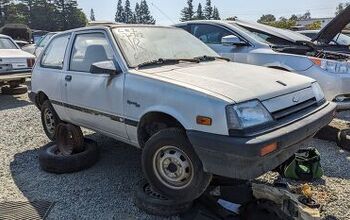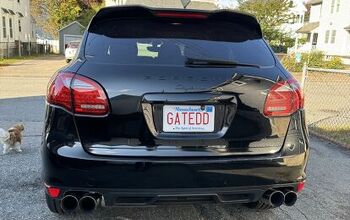BMW CEO Apologizes For Telling The Truth About EVs

On April 18th, BMW CEO Jim O’Donnell met in New York with reporters, amongst them TTAC’s Jack Baruth. At the meeting, O’Donnell opined that the U.S. government should end the $7,500 tax credit for EVs. “I believe in a free economy. I think we should abolish all tax credits,” O’Donnell said, noting that it was his personal opinion.
O’Donnell also said that “from a practicality point of view, EVs won’t work for most people. For at least 90 percent and maybe more of the population, an EV won’t work at the current battery range.” What else is new? A 10 percent market share for EVs usually is regarded as widely optimistic. And we all know that German automakers are not particularly excited about electrification. The quote wasn’t newsworthy, and did not rate a mention in Jack’s report about the meeting.
Interestingly, the meeting had been the kick-off for BMW’s ActiveE EV lease program. If a CEO says that a new product is not all things to all people, he usually gets praises for being candid. This apparently does not apply in the world of faith-based motorization.
The Detroit News picked up the quote. From the DetN, a firestorm raged through the plug-in blogosphere. O’Donnell’s remarks were treated as anti-electric racism. Autobloggreen demanded an apology. AllCarsElectric rapped O’Donnell for forgetting “to not say horrible things about your product.” Treehugger said the 90 percent remark was “a pretty oversimplified statement, to say the least.” The rest of the firestorm in the blogosphere … was the usual copypasting.
Two days ago, O’Donnell committed a cardinal sin in the corporate propaganda business. He violated the rule that says “if you stepped into the shit, don’t parade around the house.” The incident had been long forgotten, and filed away in the cabinet of memorable EV quotes. Like Volkwagen’s Christian Klinger’s “the electric car is not a request from the customer, the electric car is a request from the government.” Or the much more diplomatic “Maybe 90% wouldn’t choose [an EV] as a first vehicle, but they may choose it as a second vehicle,” by Chevy Volt spokesman Rob Peterson.
Instead of letting it go and rot in the cabinet of EV quotes, O’Donnell issued an apology. Since when does a BMW CEO apologize? He sure did. In a statement, O’Donnell said:
“On April 18th, I had a conversation reported in the Detroit News that has caused a great deal of concern over the past week. I realize I could have been clearer in my comments and I sincerely apologize if I have offended the strong network of electric vehicle advocates whose support has been deeply meaningful to us at BMW.”
“We also understand that we are a country of diverse living and driving conditions and that electric vehicles may not be the natural choice for all drivers, many of whom will want to choose other advanced technology vehicles. “
“I am sorry for the confusion and concern I have caused. While I clearly should have chosen my words more carefully, rest assured, BMW is fully behind electric vehicles and all of the ongoing innovation in this area. We live in a diverse world and our company is working very hard on meeting the needs of our wide range of customers all over the world.”
Now THAT created a firestorm. The DetN basks in the glory of feeding BMW crow, which their CEO ate. From Fiskerkarmablog to Electriccarnews, all are happy to hear that O’Donnell apologized for saying the truth. We live in a strange world where you have to say that you are sorry that you did not lie.

Bertel Schmitt comes back to journalism after taking a 35 year break in advertising and marketing. He ran and owned advertising agencies in Duesseldorf, Germany, and New York City. Volkswagen A.G. was Bertel's most important corporate account. Schmitt's advertising and marketing career touched many corners of the industry with a special focus on automotive products and services. Since 2004, he lives in Japan and China with his wife <a href="http://www.tomokoandbertel.com"> Tomoko </a>. Bertel Schmitt is a founding board member of the <a href="http://www.offshoresuperseries.com"> Offshore Super Series </a>, an American offshore powerboat racing organization. He is co-owner of the racing team Typhoon.
More by Bertel Schmitt
Latest Car Reviews
Read moreLatest Product Reviews
Read moreRecent Comments
- ToolGuy TG likes price reductions.
- ToolGuy I could go for a Mustang with a Subaru powertrain. (Maybe some additional ground clearance.)
- ToolGuy Does Tim Healey care about TTAC? 😉
- ToolGuy I am slashing my food budget by 1%.
- ToolGuy TG grows skeptical about his government protecting him from bad decisions.


































Comments
Join the conversation
Ooooh, one of these things! I love these things. If your EV has an effective all-weather range of 70 miles or so you had better not have a commute longer than 10 miles. There are contingencies to every commute. Say you forget your laptop half way to work and need to turn around to get it. Say that you find out you need to make a special trip to the doctor's office when you find out your kid was sent there from school. You can still make an EV work in these cases, but you'd better not be using it anywhere close to its capabilities just for steady-state commuting duty. So I think an EV remains a very nice lifestyle statement for people who like to buy products that make them feel good about themselves and superior to others.
So-called "green" power is much more subsidized than conventional electricity: http://media.hotair.com/wp/wp-content/uploads/2011/03/energy-subsidies.jpg